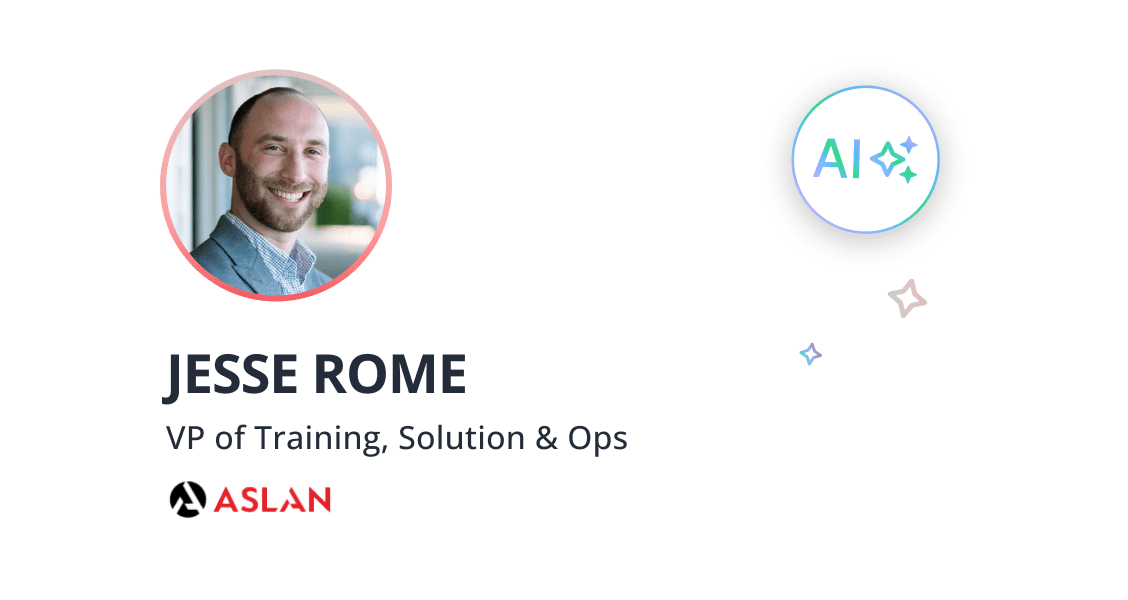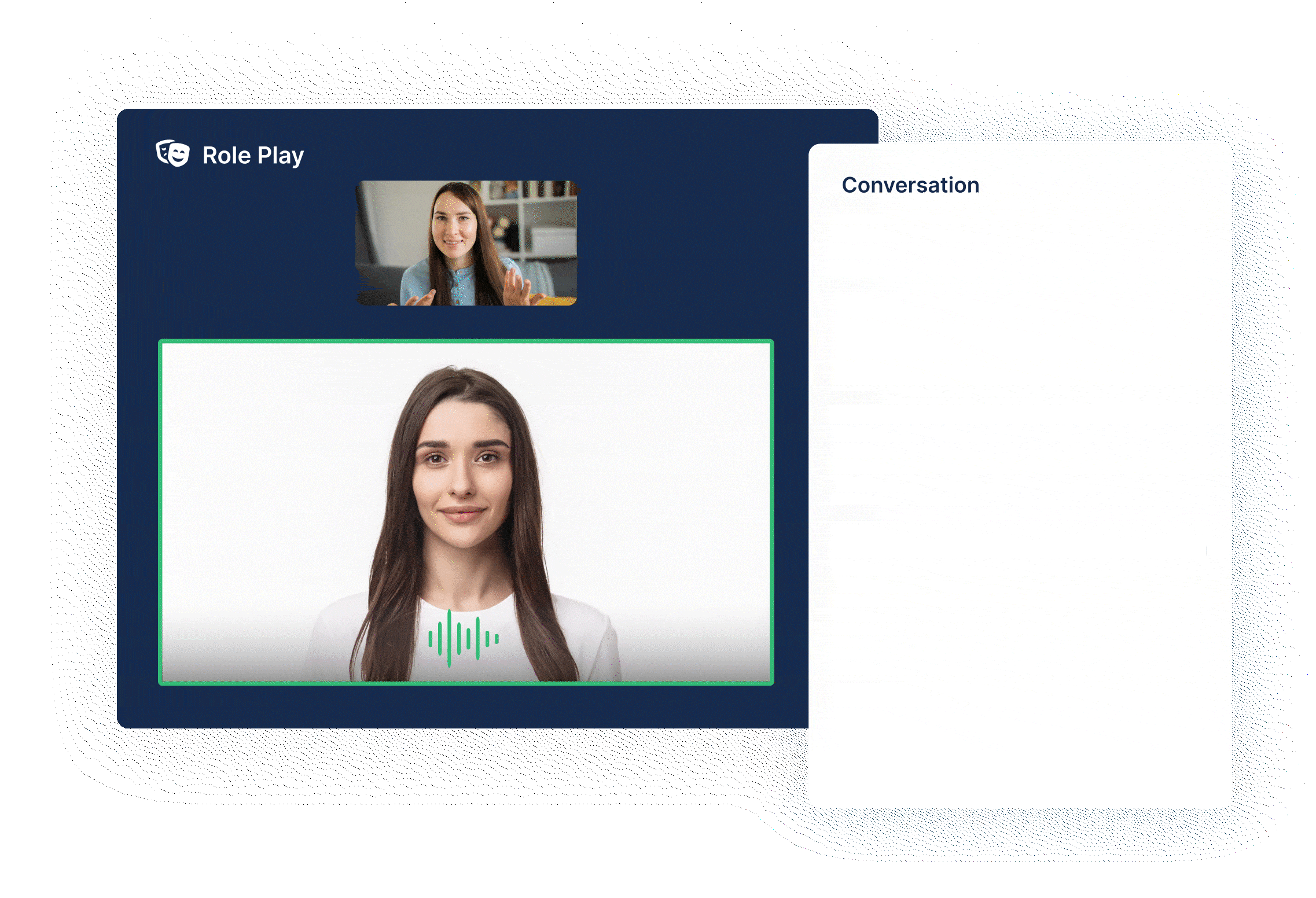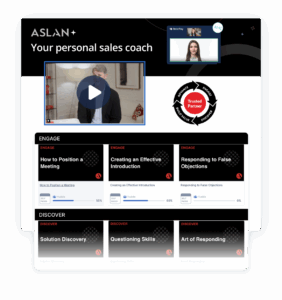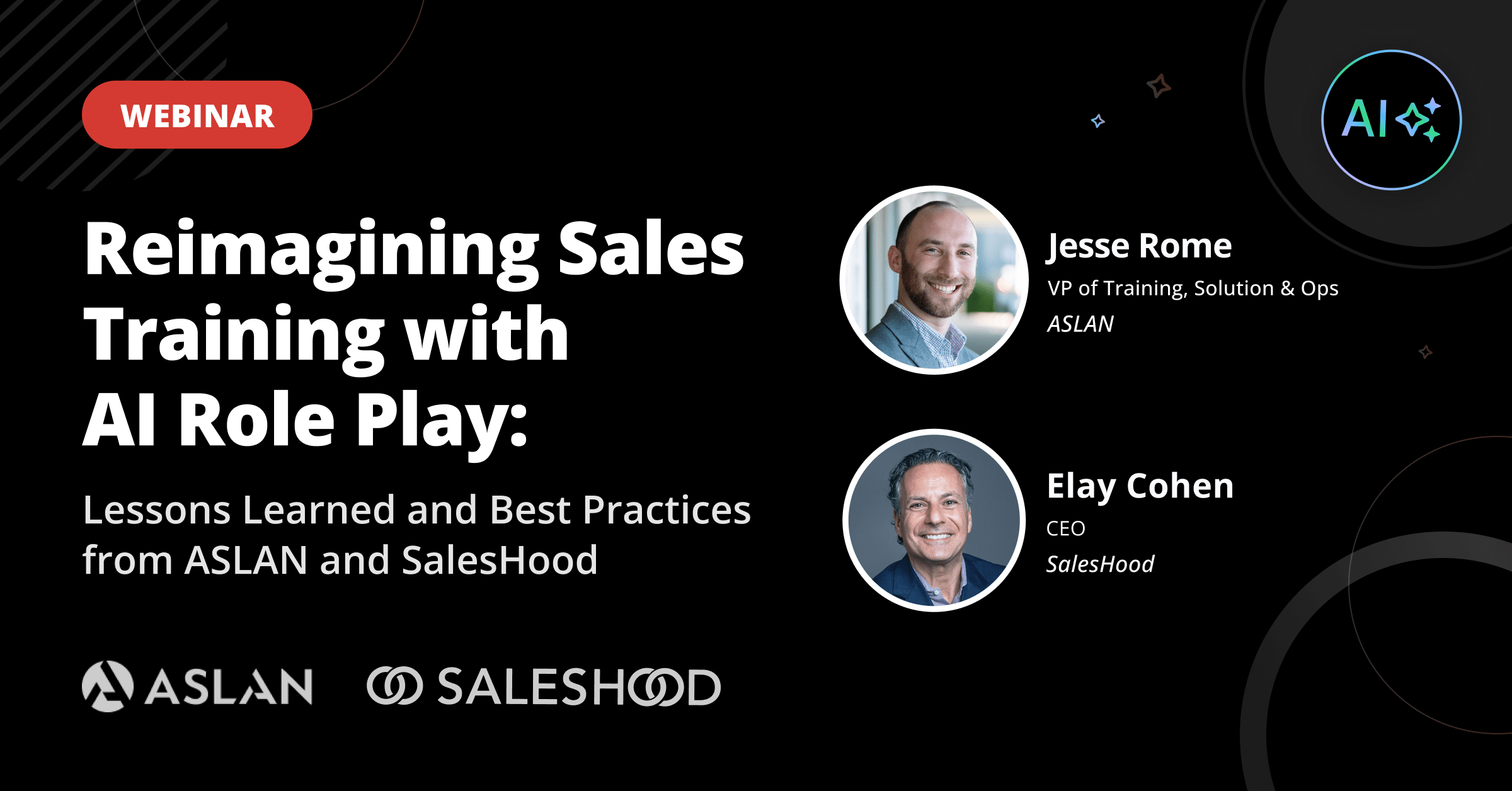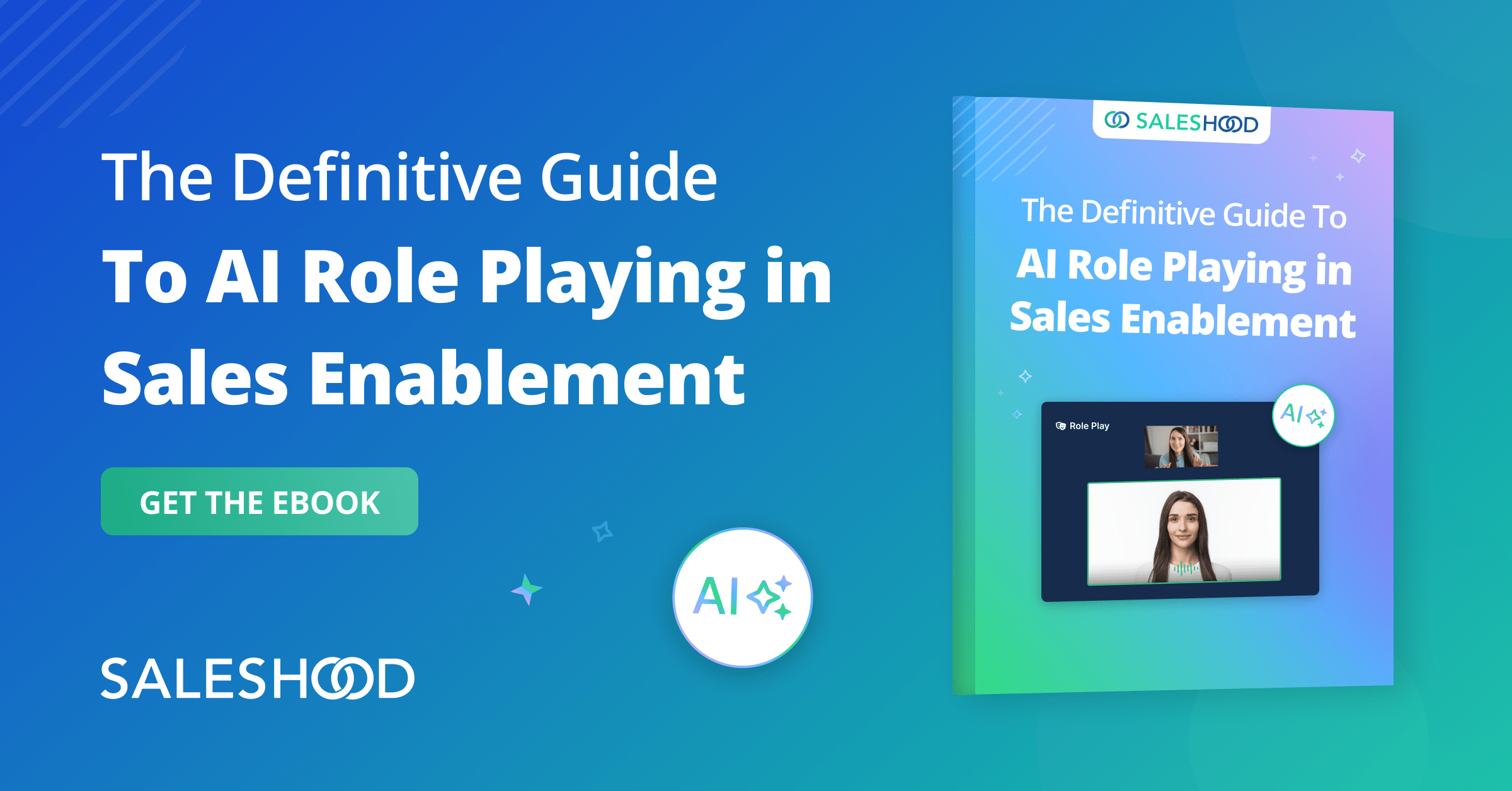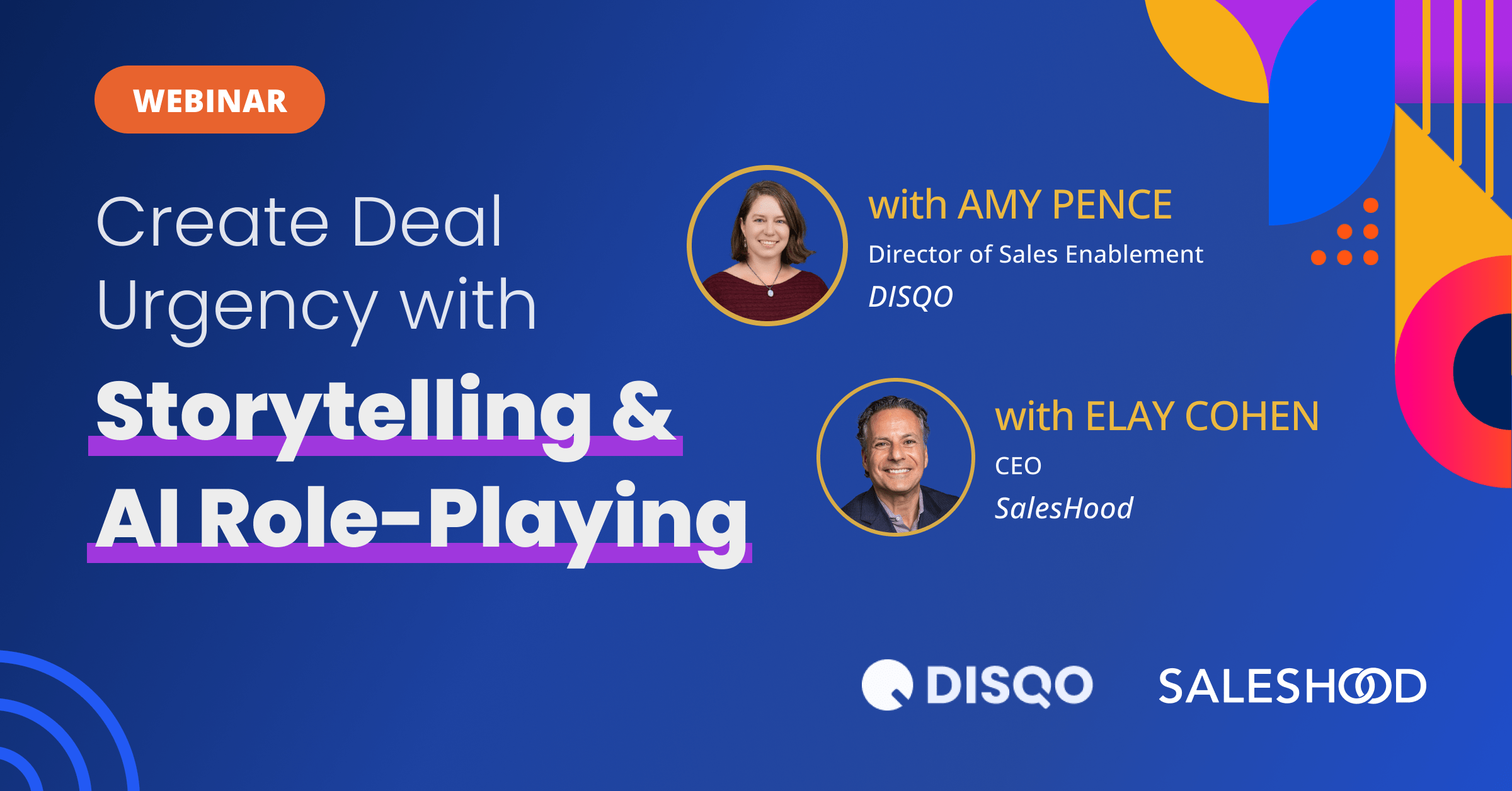In our recent webinar with Jesse Rome, VP of Training and Solutions at ASLAN, we explored how artificial intelligence (AI) is reshaping the way companies approach sales training. Jesse went beyond theory, sharing real-world examples, lessons learned, and a live demo of how AI coaching and role play are helping sellers ramp faster, reinforce skills, and build lasting confidence. Jesse is on the forefront of AI innovation in the sales training world.
Sales training has always faced the same challenge: how do you take knowledge from a workshop and make it stick? For decades, organizations invested billions of dollars in workshops, bootcamps, and onboarding programs, only to watch most of the learning evaporate within days. Studies show that 50% of training is forgotten within 24 hours, and up to 90% within a week if it isn’t reinforced.
This blog recaps the highlights from our discussion with Jesse and dives into key insights:
- How AI is shifting sales training from one-time workshops to continuous reinforcement
- Why it creates a safe space for practice
- What the future holds for sales enablement in an AI world.
From One-Time Events to Continuous Reinforcement
The biggest flaw in traditional sales training is that it’s episodic. Training happens once a quarter or at a sales kickoff. Reps attend a multi-day workshop or complete a new-hire bootcamp, and then they’re sent back into the field. Managers are all well intended. They want reinforce the skills during one-on-ones, but competing priorities and limited time often get in the way. The result? A steep forgetting curve.
As Jesse Rome, VP of Training and Solutions at ASLAN, explained during our recent webinar:
|
“Real change does not happen in a workshop. It happens one-to-one, and your manager can’t always be the one doing that one-to-one. You can now use AI as that one-to-one feedback tool.” |
This turns training into a continuous experience. Instead of waiting for the next workshop, reps get just-in-time practice and feedback in the flow of work.
Creating a Safe Space for Practice
One of the reasons reps avoid practice is embarrassment. Role playing in front of peers or managers can be uncomfortable, and feedback is often rushed or inconsistent. But as any athlete or musician knows, practice is the key to mastery.
AI provides a safe, private environment where reps can practice as much as they need. Jesse noted, “What if we can get you to practice, get live feedback, and calibrate on that without the embarrassment?”
The best part is the instant feedback loop. AI can analyze tone, pacing, keyword usage, and even sentiment. Instead of vague comments like “be more confident,” reps receive specific, actionable guidance.
Scaling Coaching Beyond Managers
Sales managers are the linchpin of enablement, but they are stretched thin. Between pipeline reviews, deal strategy, and hiring, coaching often falls to the bottom of the list.
AI steps in as a scalable coaching assistant. It doesn’t replace the manager — it amplifies their impact. Managers can assign AI roleplays, see performance dashboards, and focus their time on the highest-value coaching conversations.
Jesse highlighted a surprise benefit:
|
“We’re not just helping the reps, we’re actually helping the managers. They’re seeing what good feedback looks like, because they don’t always have time or the training to give that level of detail.” |
Shortening Ramp Time and Increasing Readiness
Time to readiness has always been a costly challenge. Traditional onboarding programs can take weeks or months, while the business waits for reps to start contributing to the pipeline.
With AI, readiness comes faster. Jesse shared that organizations are seeing real change within 3–6 months as early KPIs turn into measurable results. And for BDRs and SDRs, reps are getting on the phone weeks earlier than before.
This is a game-changer for companies that want to accelerate productivity while keeping training costs manageable.
Making Learning Relevant and Sticky
Generic training content rarely resonates. AI enables hyper-personalization — tailoring training to a specific role, vertical, or even account.
Jesse described how ASLAN uses AI to simulate real buyer interactions:
| “Take the example of a cold call. There are three different skills baked into it: your opener, your questions, and handling objections. With AI, we can simulate all of those and give reps feedback on each skill before they ever dial a number.” |
Because training is directly tied to the scenarios reps face daily, it sticks.
Traditional sales training is heavily weighted toward the front end of the funnel. But AI extends training across the entire customer journey.
As Jesse explained,
| “This isn’t just for pre-sale. It’s also for account managers, whose bread and butter is retention and growth. We’re building scenarios for QBRs, presentation skills, and objection handling long after the first deal is closed.” |
This creates a holistic enablement experience that spans prospecting, selling, onboarding, and renewal.
Driving Measurable Impact
Perhaps the most exciting shift is that AI allows organizations to measure what was previously unmeasurable.
In Jesse’s words: “Development has always been driven by desire. But how do you measure desire? With this tool, we finally have something to measure it.”
AI doesn’t just deliver training — it tracks practice, scores improvement over time, and ties learning behaviors to business outcomes.
Preparing for the Future
We are still in the early days of AI in sales training. Today’s applications focus on role-play, feedback, and reinforcement. But the horizon is expanding quickly.
Jesse offered a glimpse: “Imagine a world where I could just drag in a LinkedIn profile and say, customize the scenario according to this. Or AI that follows you, knows what you struggle with, and proactively recommends what to practice next.”
The future of sales training will be proactive, personalized, and omnipresent — with AI coaching embedded directly in CRM, email, and mobile devices.
AI is not replacing sales trainers, managers, or enablement professionals. It’s giving them superpowers. By automating reinforcement, creating safe practice environments, scaling coaching, and personalizing learning, AI is solving the age-old problems of sales training: stickiness, adoption, and impact.
As Jesse put it best: “Change is hard. But if you change nothing, nothing will change.”
The organizations that embrace AI in sales training will see faster ramp times, more confident reps, higher win rates, and stronger customer relationships. Those that don’t risk being left behind in a world where the pace of learning is becoming a competitive advantage.
Watch the full webinar here:
